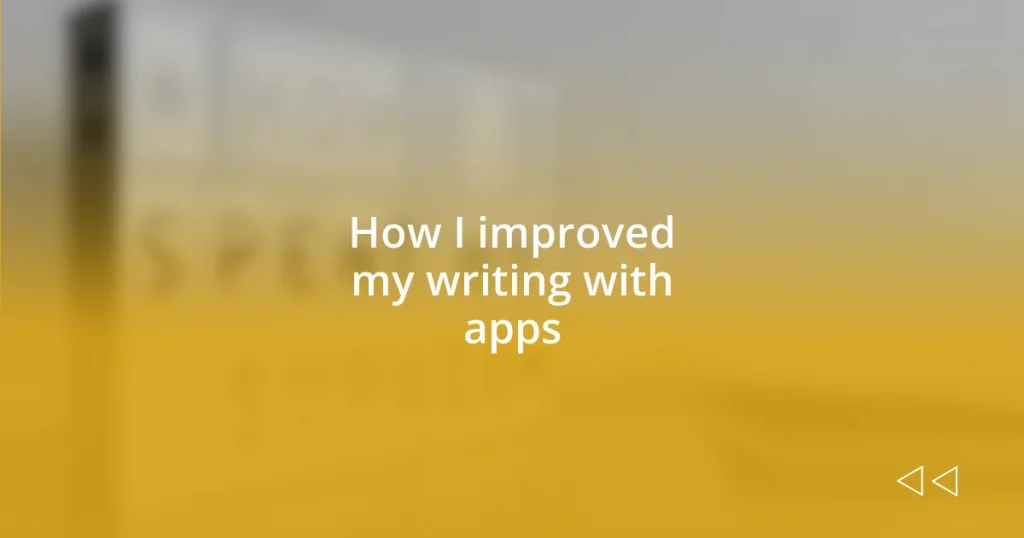Key takeaways:
- Identifying writing challenges, such as self-doubt and lack of consistency, is essential for overcoming creative blocks.
- Creating a conducive writing environment and selecting the right writing apps can significantly enhance productivity and creativity.
- Tracking progress, setting specific goals, and celebrating achievements are crucial for maintaining motivation and fostering continuous improvement in writing skills.
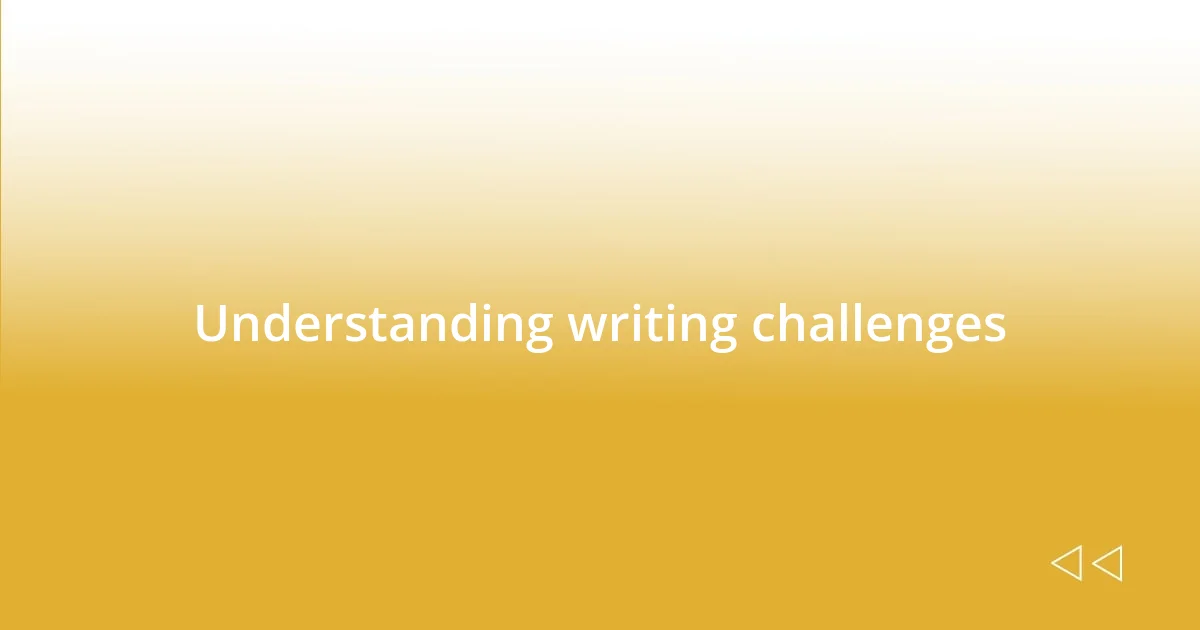
Understanding writing challenges
Writing challenges can often feel overwhelming, and I can completely relate to that frustration. There were times when I stared at a blank screen, paralyzed by self-doubt. Have you ever felt that way? It’s disheartening, yet it’s a common struggle many writers face.
The pressure to find the perfect word or phrase can lead to anxiety. I remember sitting in a café, trying to articulate a feeling, only to be met with a cloud of uncertainty. It made me question my ability to express myself. This experience prompted me to dig deeper into understanding what was blocking my creativity, which is essential for improvement.
Another challenge I encountered was consistency; I often lacked motivation and direction. It was tough to maintain a regular writing schedule amidst life’s distractions. I’ve learned that identifying these hurdles is the first step toward overcoming them, and it opens up pathways to explore new strategies. What challenges have stopped you in your tracks?

Choosing the right writing apps
Choosing the right writing app can be a game changer in your writing journey. I remember the moment I decided to experiment with different writing tools. Each app I tried had its unique features, and those little tweaks made a significant difference in my productivity. Have you ever felt stuck with one tool but realized it wasn’t tailored to your needs? That’s a common realization many writers face.
When selecting a writing app, consider what features resonate with your personal style. For instance, some writers thrive in minimalist environments, while others may need robust organizational features to keep their thoughts structured. My preference leaned toward simplistic interfaces, which helped me focus better, steering clear of distractions. Reflecting on your writing habits can be the key to finding an app that feels just right.
Lastly, I encourage you to test out a few apps before settling on one. Think of it as dating — finding that perfect match takes some trial and error. I often found myself alternating between apps, discovering what worked and what didn’t. This explorative process not only enhanced my writing but also helped me understand my own preferences. So, what will you look for in a writing app?
| Writing App | Key Features |
|---|---|
| Scrivener | Project management, organizes research and notes |
| Grammarly | Real-time grammar and spell checks, writing style suggestions |
| Evernote | Note-taking, tagging system for easy organization |
| Ulysses | Focus mode, distraction-free writing, Markdown support |
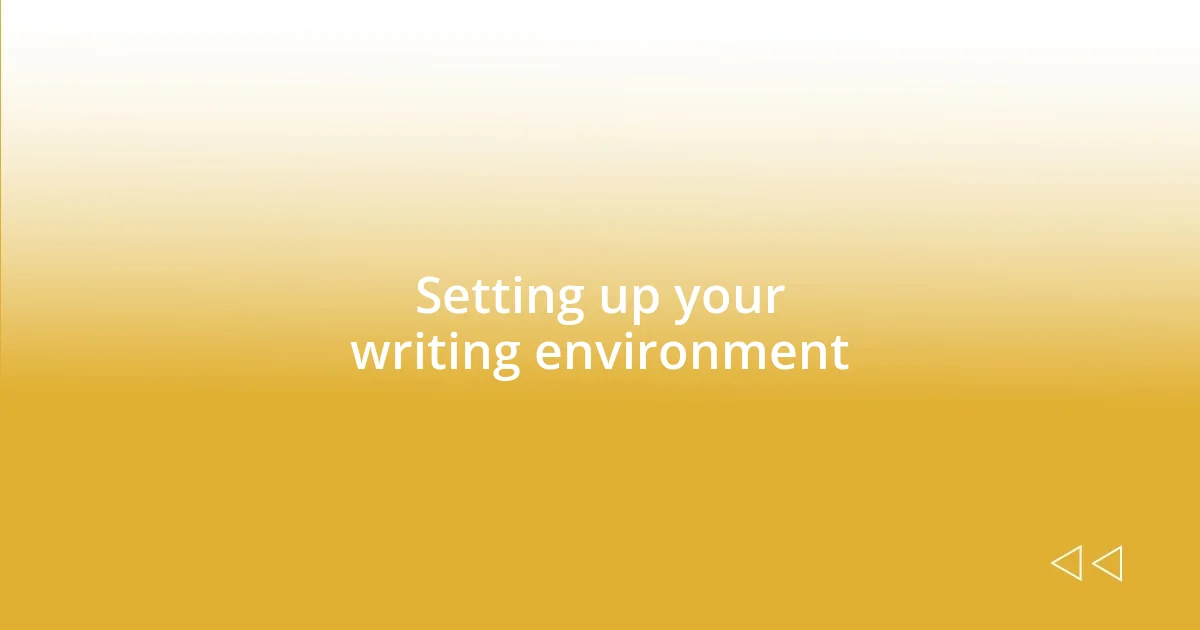
Setting up your writing environment
Setting up my writing environment was a pivotal step in my journey. I can vividly recall finding the perfect corner in my home that became my writing sanctuary. It wasn’t just about choosing a space; it was about creating an atmosphere that nurtured my creativity. The right lighting, a comfortable chair, and even a couple of plants made a world of difference in my focus and motivation. My writing space evolved into a safe haven where ideas flowed freely, almost like a warm hug for my creativity.
To enhance your writing environment, consider these elements:
- Lighting: Natural light can elevate your mood, while softer lamps create a cozy atmosphere for late-night sessions.
- Sound: Experiment with background music or white noise that boosts your concentration. I’ve found that lo-fi beats help me maintain my rhythm.
- Comfort: Invest in ergonomic furniture that supports long hours of writing. Comfort fuels creativity, after all.
- Personal Touch: Add items that inspire you, like art or motivational quotes. These little things can spark joy and creativity in unexpected ways.
Establishing a writing environment that resonates with your personal style is essential. It’s about creating a space that feels uniquely yours, allowing you to dive into the writing process without distractions or discomfort.
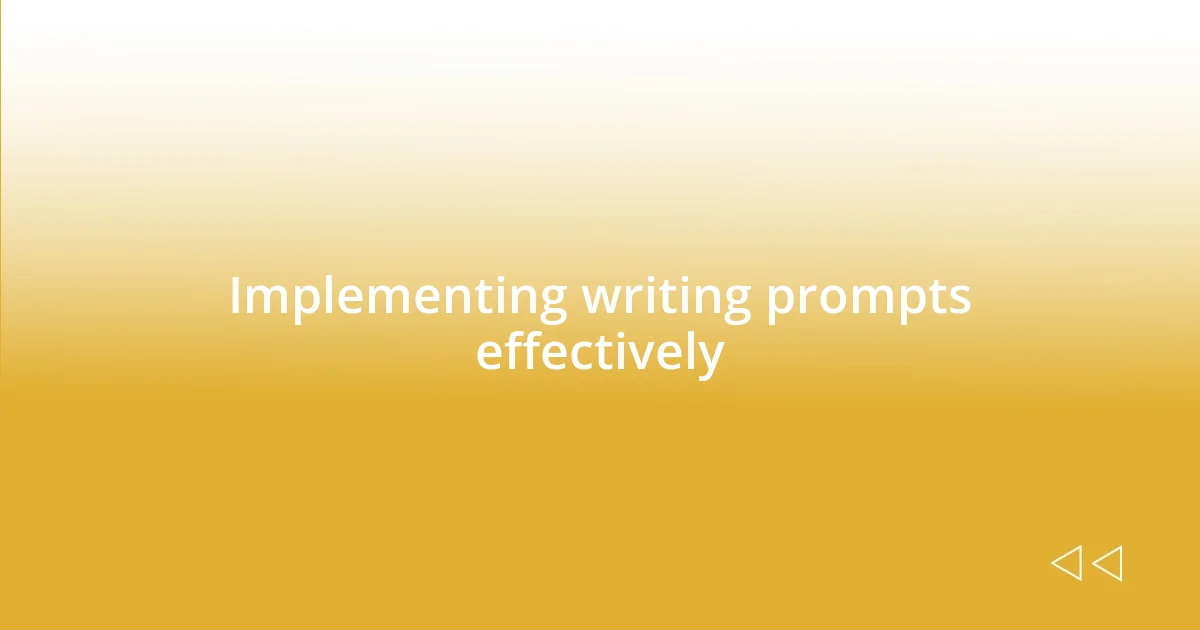
Implementing writing prompts effectively
Using writing prompts has been a transformative experience for me, and I’ve discovered that the key lies in finding the right ones that ignite my creativity. Sometimes, a simple phrase or question can trigger a cascade of thoughts and ideas. I remember a day when a prompt about “the last time I felt truly free” led me to reflect deeply on a childhood memory at the beach, and suddenly, my imagination was off to the races. Isn’t it fascinating how a few words can unlock such vivid memories?
To implement writing prompts effectively, I recommend setting aside specific times dedicated to these exercises. Making this a regular habit not only builds your writing skills but also encourages a mindset of exploration. I personally set a timer for ten minutes and just let my thoughts flow, knowing that there are no right or wrong answers. This practice often results in unexpected breakthroughs, turning ordinary days into creative gold mines. Have you tried giving yourself the freedom to write without self-editing?
Another exciting aspect of using writing prompts is the opportunity for collaboration. Sometimes, sharing a prompt with a writing group or a friend can lead to perspectives I never considered. I recall a session where we exchanged our responses, finding connections and themes that sparked further discussion. These collaborative moments not only deepen our connections but also enrich our writing journeys. How often do you engage your writing community in creative exercises?
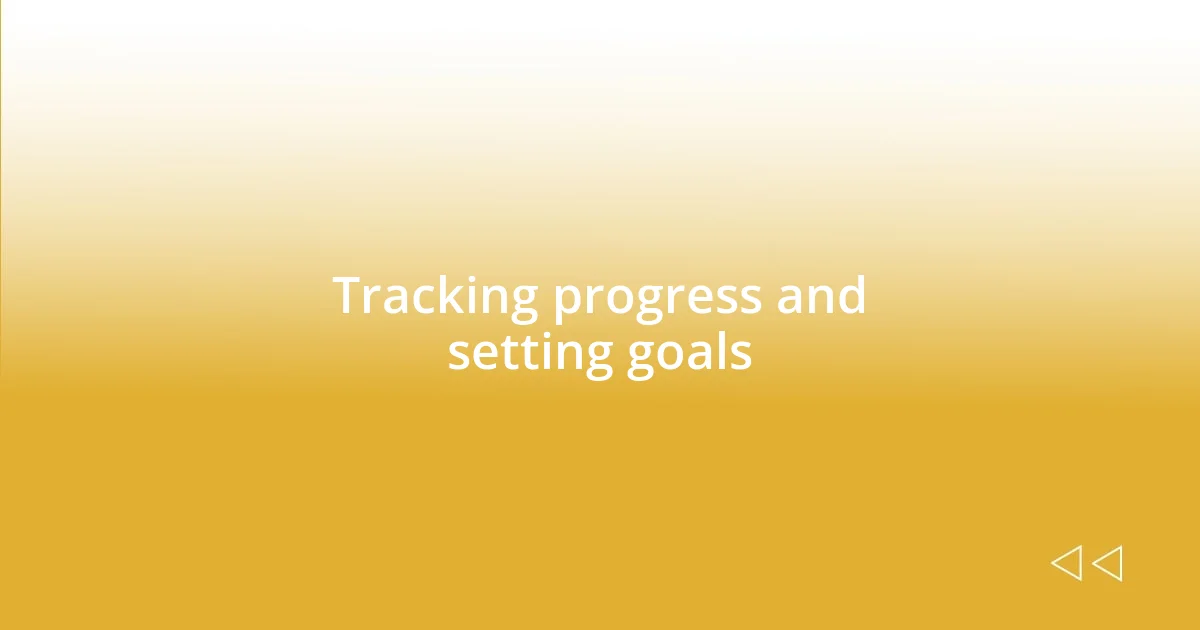
Tracking progress and setting goals
Tracking my progress has been a game changer in my writing journey. I remember when I first set ambitious writing goals but often lost sight of my achievements. Entering my daily word count into an app not only helped me visualize my productivity but also gave me a sense of accomplishment with each milestone I achieved. Have you ever felt that rush of motivation just by seeing your progress laid out in front of you?
Setting specific goals is equally crucial. For instance, instead of saying, “I want to write more,” I began focusing on quantifiable targets like “I will write 500 words every day.” This shift made my aspirations feel more tangible. And let me tell you, hitting those targets often felt like winning a small victory. Isn’t it amazing how a clear framework can turn abstract goals into achievable steps?
I also love using apps that offer reminders and check-ins. There’s a comforting reliability in those pings on my phone, nudging me to stay on track. Once, during a particularly busy week, a simple reminder pushed me to carve out thirty minutes for writing—time I might have otherwise overlooked. It’s surprising how these small prompts can cultivate discipline and consistency. How do you keep yourself accountable in your writing journey?
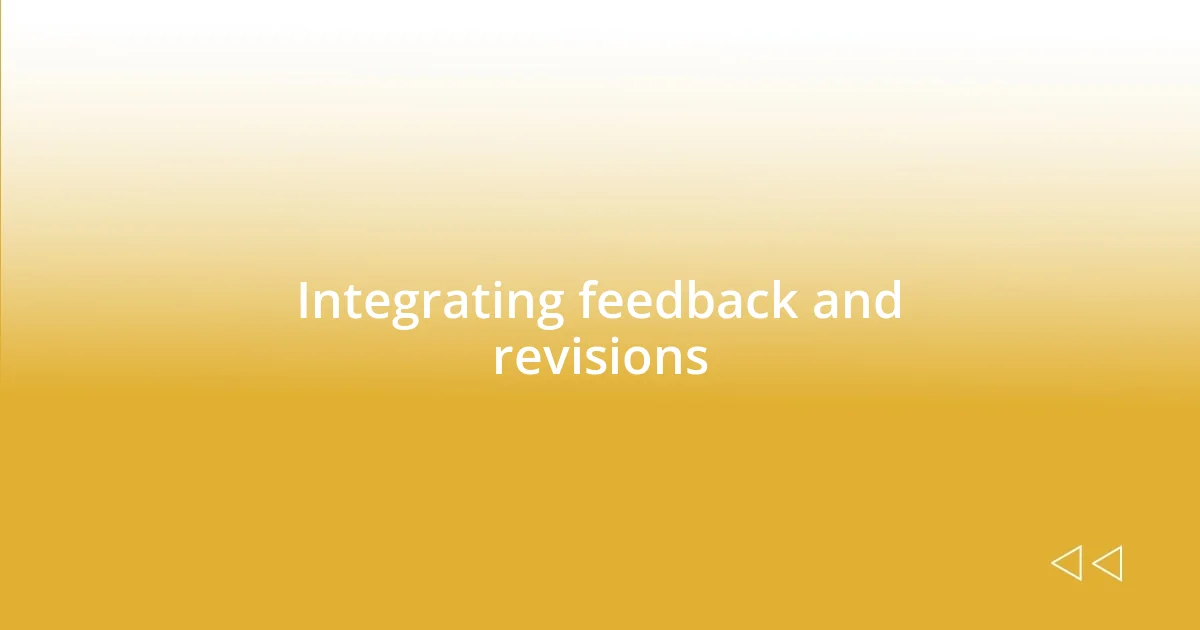
Integrating feedback and revisions
Integrating feedback has been a crucial part of refining my writing skills. I vividly recall a moment when a fellow writer pointed out my overuse of adverbs. Initially, I felt defensive, but after reflecting on their feedback, I realized they had a point. Eliminating excessive adverbs made my prose sharper and more impactful. Isn’t it amazing how constructive criticism can turn a blind spot into a learning opportunity?
Revisions are not just about correcting mistakes; they’re about enhancing the overall message. I once revisited an essay that seemed solid at first glance. However, after a thoughtful critique from my writing group, I discovered it lacked emotional depth. By digging deeper into my experiences, I infused more passion into the piece. When was the last time you revisited your work with fresh eyes and a different perspective?
Feedback tools also come in handy for streamlining the revision process. For example, I’ve found that using apps like Grammarly helps spot inconsistencies before I even submit my work. The satisfaction of hitting ‘recheck’ after making revisions gives me a sense of accomplishment. Have you tried leveraging technology to make feedback integration smoother? It’s a small but significant step towards elevating the quality of your writing.
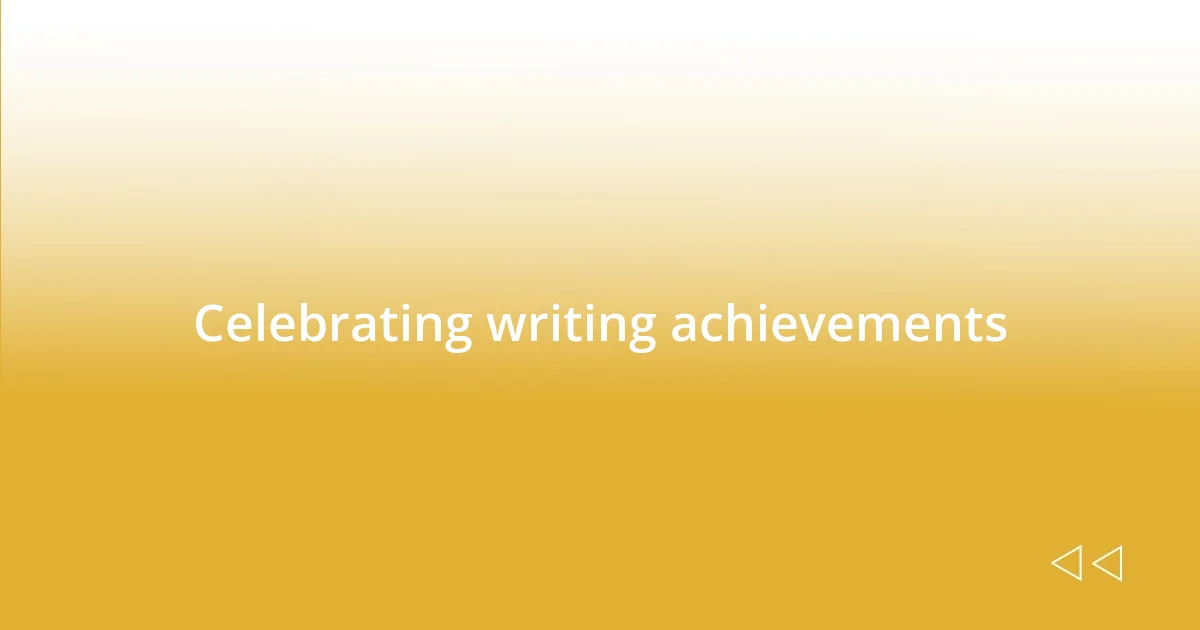
Celebrating writing achievements
Celebrating writing achievements is something I deeply cherish. I can still recall the exhilaration of finishing my first short story, a moment that felt monumental. Sharing that story with friends and family transformed my nervousness into pride as they expressed genuine enthusiasm for my work. Have you ever had that rush of joy when someone truly connects with your writing? It’s a reminder of why we write in the first place.
When I began using writing apps, I found new ways to celebrate small victories. For instance, I created a dedicated space in my journal where I wrote down every article and story published. The satisfaction of checking them off—and revisiting that list—fuels my motivation to keep writing. There’s something invigorating about acknowledging where I started and how far I’ve come. Do you have a method of tracking your achievements that resonates with you?
Moreover, I’ve started sharing my milestones on social media, which surprisingly added another layer of celebration. I remember posting about finishing a challenging piece, and the enthusiasm from my followers was overwhelming. This communal support not only boosted my morale but also connected me with others on similar journeys. How do you share your writing victories? It’s fascinating how sharing our experiences can create a tapestry of inspiration and encouragement for everyone involved.










